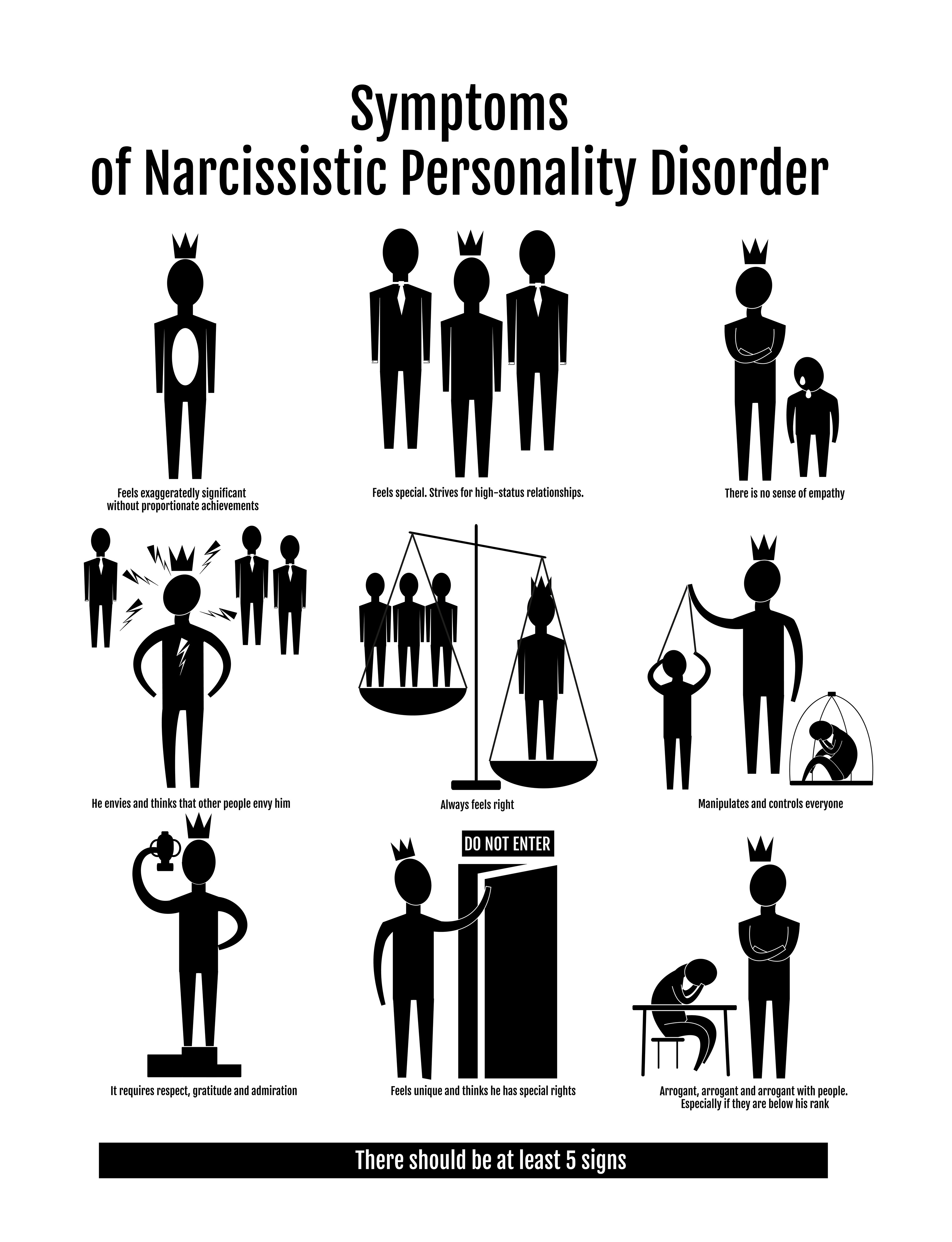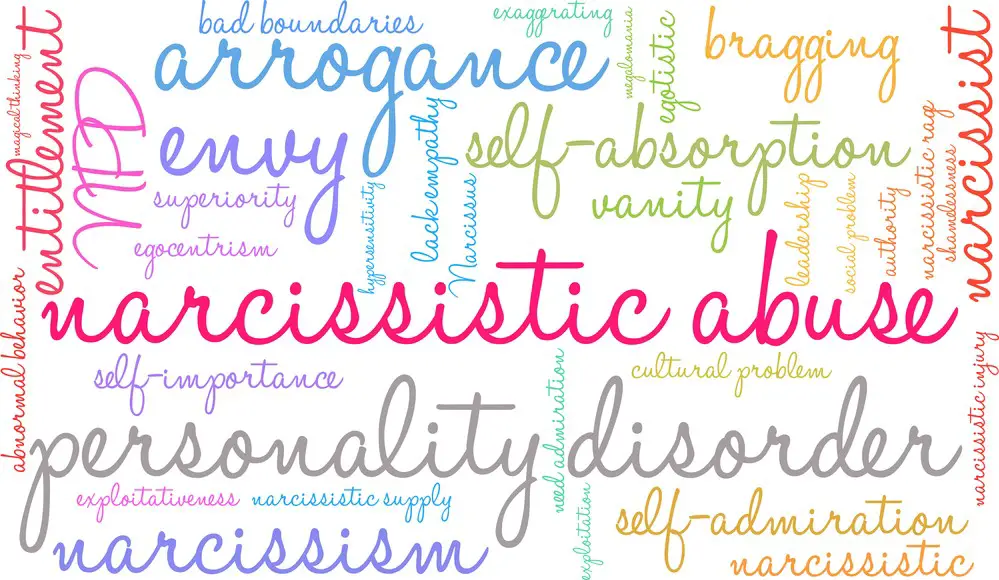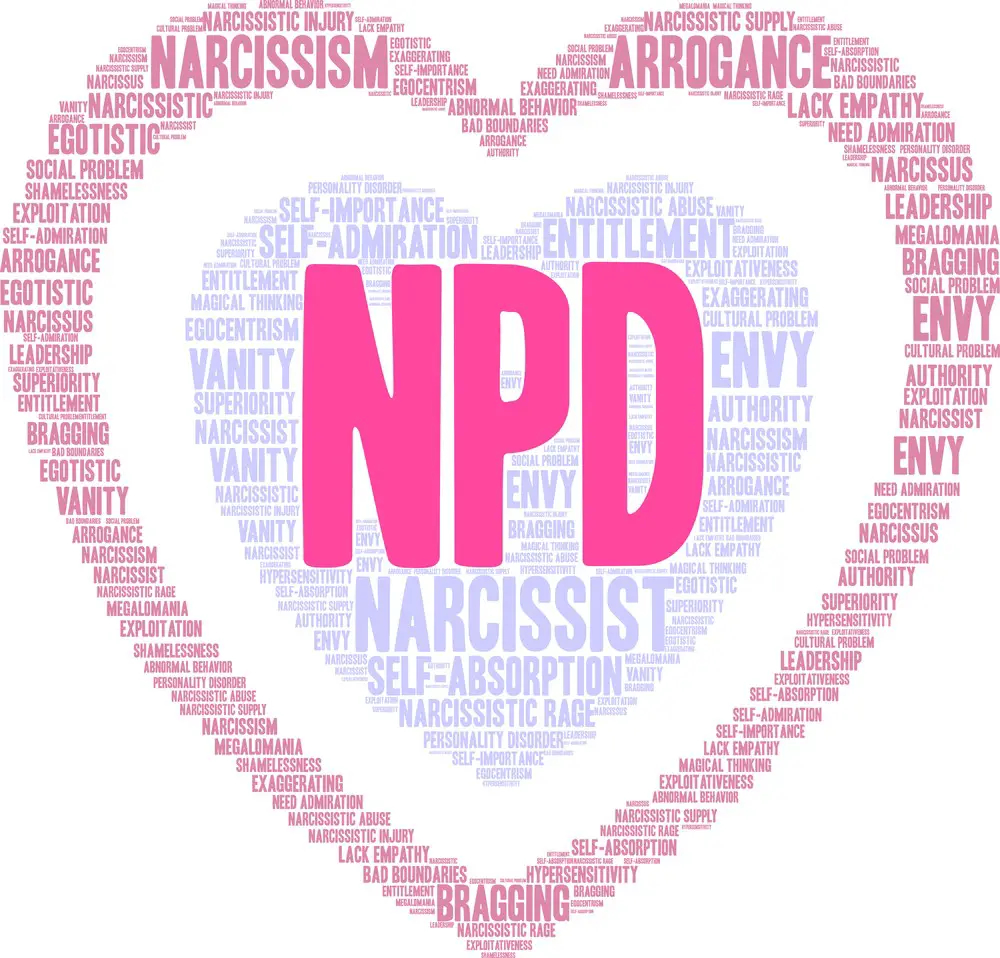As a BetterHelp affiliate, we receive compensation from BetterHelp if you purchase products or services through the links provided
Narcissism is a personality trait that has gained widespread attention in recent years, particularly when understanding its impact on relationships and interactions. When discussing male narcissists, it is essential to highlight key characteristics, potential causes, and how to manage interactions with them.
Male narcissists possess an inflated sense of self-importance, often seeking admiration and validation from others. They exhibit a lack of empathy, unwilling or unable to understand the feelings and experiences of those around them. Narcissistic behavior can negatively impact relationships, creating emotional turmoil for narcissists and their partners, friends, or colleagues.
Understanding and identifying male narcissism is crucial in addressing the issue and providing a foundation for fostering healthier relationships and communication. With the right knowledge, navigating the complexities of interactions with male narcissists is possible, reducing the potential for psychological harm to all parties involved.
Key Takeaways
- Male narcissists have a heightened sense of self-importance and seek validation from others.
- Narcissistic behavior can result in emotional turmoil in personal and professional relationships.
- Recognizing and understanding male narcissism enables healthier communication and interactions.
 Understanding Narcissism
Understanding Narcissism
Narcissism is a personality disorder characterized by a grandiose sense of self, excessive self-esteem, and a strong desire for special treatment from others. It is a complex psychological condition that can manifest in various ways, impacting the individual’s interpersonal relationships and overall well-being.
Individuals with high levels of narcissism often have an inflated view of their achievements and abilities. This elevated self-image might fuel their belief that they are entitled to special treatment and should be held in high regard by others. The need for admiration and validation from others is a key feature of this disorder, making it difficult for them to handle criticism well.
Persons with narcissistic personality disorder may also struggle with empathy, which refers to their ability to understand and share the feelings of others. Their focus on their needs and desires can overshadow their capacity to connect with the emotional needs of those around them. This can lead to strained relationships and a lack of genuine emotional connections, causing further strain on their mental health.
In some cases, narcissistic individuals can also have fragile self-esteem, despite their outward appearance of confidence. This is because their self-worth may be built on a shaky foundation that relies heavily on external validation from others. Unable to maintain a stable sense of self, they may experience swings in their emotional states when the praise or admiration they require is lacking.
Narcissism can manifest in different forms and scenarios. While some individuals with narcissistic traits may seem overly confident and self-assured, others may display more subtle behaviors that denote self-centeredness and a need for admiration. It’s essential to consider the nuances of narcissism while seeking a better understanding of this personality disorder and its effects on the individual and those around them.
 Definition and Symptoms of Male Narcissist
Definition and Symptoms of Male Narcissist
A male narcissist has narcissistic personality disorder (NPD), a mental health condition characterized by an inflated sense of self-importance, an excessive need for admiration, and a lack of empathy. Narcissistic behaviors in men often stem from a combination of genetic and environmental factors.
NPD may manifest in grandiose behaviors, such as exaggerating achievements and talents, seeking constant praise and admiration, and an obsession with power, success, and physical appearance. Male narcissists may also exhibit the following symptoms:
- Lack of empathy: Narcissists struggle to relate or understand the emotions of others, often leading to a disregard for other people’s feelings.
- Sense of entitlement: They may have an unrealistic sense of entitlement and expect others to cater to their needs.
- Manipulative and controlling: Narcissists use manipulation and control tactics to keep others submissive and maintain their power.
- Envious: They may feel envious of others’ success and believe others are envious of them.
- Arrogant and boastful: The male narcissist may regularly brag about his accomplishments and belittle others.
Apart from these symptoms, male narcissists often show specific behaviors that distinguish them from others. These behaviors include:
- Exerting control in relationships
- Dominating conversations, focusing on themselves and their achievements
- Becoming aggressive or hostile when challenged
- Using others for personal gain or to achieve their goals
Recognizing the signs and symptoms of a male narcissist is crucial in understanding how to interact with them or, when necessary, seek professional help.
The cause of narcissistic personality disorder is unknown, but experts believe a combination of genetic and environmental factors contributes to its development.
 Psychological Perspective
Psychological Perspective
Narcissistic Personality Disorder (NPD) is a mental health condition characterized by a pervasive pattern of grandiosity, a constant need for admiration, and a lack of empathy. It is classified in the Diagnostic and Statistical Manual of Mental Disorders (DSM-5) as one of the ten personality disorders.
A personality disorder is an enduring pattern of inner experience and behavior that deviates significantly from cultural norms, is inflexible and pervasive, starts in adolescence or early adulthood, and leads to distress or impairment. Specifically, individuals exhibit an inflated sense of self-importance and superiority in NPD. They often fantasize about unlimited power, success, or ideal love and may display arrogance and conceited behaviors.
There are two subtypes of male narcissists: overt and covert. Overt narcissists are more easily recognized as they showcase self-assuredness, entitlement, and a constant need to be admired by others. On the other hand, covert narcissists can be more challenging to identify. Despite possessing similar traits, they may seem shy or introverted and can be hypersensitive to criticism.
Vulnerability plays a vital role in the psychological profile of narcissists. While they may project an image of strength and self-confidence, their self-esteem frequently depends on recognizing and validating their achievements. This makes male narcissists prone to narcissistic injuries, which can occur when they face criticism or perceived threats to their self-worth. Consequently, they may react with rage, despair, or passive-aggressive behaviors.
Due to NPD’s complex and multifaceted nature, treatment often involves a combination of therapy and medication. Cognitive-behavioral, dialectical behavior and psychodynamic therapy may help sufferers understand their distorted thought patterns and gain insight into their feelings of vulnerability. Medications can sometimes address symptoms like anxiety or depression, which may occur alongside NPD.
In conclusion, the psychological perspective on male narcissism entails understanding the underlying personality traits, vulnerabilities, and potential treatments associated with this mental health condition. It is crucial to note that the term “narcissist” should be used carefully to avoid perpetuating stigmas and misconceptions about those living with this complex disorder.
Traits of a Male Narcissist
A male narcissist often displays distinct character traits that distinguish him from others. One of the most recognizable traits is his arrogance in his demeanor and interactions with people. This arrogance stems from a deep-rooted sense of entitlement; he believes that he deserves the best of everything and that others should cater to his needs.
This sense of entitlement is accompanied by an inflated sense of self-importance, where the male narcissist perceives himself as highly significant and superior to others. Consequently, he tends to view those surrounding him as inferior and expects them to acknowledge his superiority. This further feeds his arrogance and affects his behavior in social settings.
A male narcissist craves admiration, often going to great lengths to achieve it. He may embellish accomplishments, display ostentatious possessions, or put down others to make himself appear greater in comparison. He thrives on the validation of others, which reinforces his self-worth and superiority.
Another common characteristic is a preoccupation with fantasies. Male narcissists may imagine themselves as extremely successful, powerful, or loved by others. These fantasies incorporate their desires for boundless admiration, control, and status. It is not unusual for the male narcissist to create an idealized self-image in his mind, further detaching him from reality.
In summary, traits of a male narcissist include arrogance, a sense of entitlement, self-importance, a need for admiration, and a preoccupation with fantasies. These characteristics demonstrate a consistent pattern of behavior that tends to disrupt their relationships and social interactions.
 The Impact on Relationships
The Impact on Relationships
A relationship with a male narcissist often entails manipulation, abuse, and control. Many women are trapped in toxic relationships with men who display narcissistic traits. A common technique used by narcissists is gaslighting, which involves distorting their partners’ perception of reality to maintain control.
In many cases, narcissistic partners engage in a cycle of abuse, often alternating between affectionate gestures and demeaning behavior. This cycle of idealization and devaluation leaves victims confused and emotionally exhausted, making it difficult for them to recognize the true nature of their partner.
Domestic violence is a common consequence of relationships with narcissistic men. They may resort to physical aggression or emotional coercion to exert power over their partners. Victims can feel isolated and helpless, unsure about how to break free.
Dating a narcissist can also lead to severe emotional damage. Narcissists tend to be serial daters, luring multiple partners with charm and charisma. However, once they have secured the attention of their target, they may become indifferent and even cruel, leaving their partner feeling devalued and used.
In summary, relationships with male narcissists can be characterized by abuse, manipulation, and emotional turmoil. Victims must recognize these patterns and seek help to end the cycle and heal from the trauma.
Genetics and Environment Factors
Genetics plays a significant role in the development of narcissistic traits. Research has shown that genetic factors and family history could predispose an individual to develop narcissistic personality disorder (NPD). For instance, having a parent or close relative with NPD may increase one’s chances of developing the disorder.
Parenting is another crucial factor that influences the development of narcissistic traits. Parents who excessively praise, protect, or indulge their children may inadvertently contribute to developing narcissistic tendencies. In contrast, parents who are emotionally distant, overly critical, or neglectful may also play a role in fostering narcissism in their children.
Culture also plays a part in shaping narcissistic traits. Many elements of modern society may encourage and cultivate narcissism, from the emphasis on self-promotion on social media to the relentless pursuit of wealth and status. Living in a culture that promotes narcissistic values may make it more challenging for individuals to resist developing these traits.
Several risk factors contribute to the development of narcissistic traits and NPD. Some of these include:
- Childhood adversity or trauma
- A history of physical, emotional, or sexual abuse
- A pattern of unstable relationships in one’s personal or professional life
- Low empathy toward others
- Chronic feelings of envy, jealousy, or resentment
In conclusion, understanding the role of genetics, parenting, and cultural factors in developing male narcissism is essential for identifying individuals at risk and intervening early to prevent or mitigate the negative consequences of narcissistic behavior.
Narcissist in the Digital Age
In the digital age, the presence of narcissists has increased significantly as opportunities for self-promotion and validation through social media have grown. Trolls, for instance, are often driven by narcissistic tendencies. These individuals need attention and relevance, which they can achieve by deliberately provoking others online.
Narcissists thrive on the instant gratification and connection provided by online platforms. Social media allows them to become the center of attention by sharing carefully curated images and stories that showcase their lives in an idealized manner. They may also use these platforms to keep tabs on their competition and maintain a sense of superiority.
Online threats become particularly relevant when discussing male narcissists, as their aggression may be fueled by a desire to maintain control and dominance. This puts others at risk, especially when sensitive and personal information is shared online. Furthermore, the digital age has provided narcissists with a broader audience, as their reach is no longer limited to the people they interact with daily.
In this era of connection, it is essential to be mindful of the potential dangers posed by narcissists who use the internet to manipulate and self-glorify. By recognizing the warning signs and setting online and offline boundaries, individuals can reduce their vulnerability to narcissistic behavior and maintain healthy relationships in the digital age.
Narcissism and Gender Roles
Narcissism can manifest differently based on gender roles. Male narcissists, in particular, may exhibit specific traits and behaviors influenced by societal expectations and norms. Due to traditional gender roles, men are often expected to be confident, assertive, and authoritative. This can lead to a higher prevalence of narcissistic traits among men, creating issues within relationships and social interactions.
Misogynistic Behavior: Male narcissists may harbor a sense of entitlement, resulting in misogynistic tendencies. They may believe they are superior to women, expecting admiration and compliance from their partners. This attitude can lead to abusive or manipulative behavior within relationships, as male narcissists insist on asserting dominance and control.
Need for Validation: Narcissistic men may crave validation from others, seeking constant admiration and praise. This need can be linked to traditional masculinity, where self-worth is often tied to success and achievements. Male narcissists may rely on external validation, making them highly sensitive to criticism and easily threatened by others’ accomplishments.
Competitive Nature: With societal expectations for men to be competitive and successful, male narcissists might view relationships as opportunities for control and power. This can result in a constant need to outperform others and protect their fragile self-esteem from perceived threats.
Lack of Empathy: Male narcissists might struggle to display empathy, as traditionally, men are taught to suppress emotions and prioritize rationality. This can lead to problems understanding and addressing others’ needs, making male narcissists appear cold and detached.
In summary, cultural expectations around gender roles can influence the expression of narcissism in men. By understanding these factors, awareness about the impact of gender norms on male narcissistic behavior can be better understood, potentially offering pathways to improve interpersonal relationships and challenge unhealthy patterns.
 Dealing with a Male Narcissist
Dealing with a Male Narcissist
Dealing with male narcissists requires a clear understanding of their signs and behaviors. Male narcissists often manipulate situations to their advantage, frequently shifting blame onto others and rarely admitting fault. They have a strong sense of entitlement and may display numerous signs of narcissism, such as constantly seeking validation or having an inflated sense of self-importance.
Setting boundaries and maintaining self-awareness is crucial when dealing with a male narcissist. Be mindful of their efforts to manipulate the situation, as they might attempt to distort reality or gaslight victims to maintain control. If necessary, consider seeking the guidance of a mental health professional to help navigate through the interactions.
It is important to avoid feeding the male narcissist’s need for attention and validation. Not providing the desired reaction may weaken their control over the situation. One should also limit exposure to their toxic environment and surround oneself with supportive and understanding individuals.
When communication is necessary, keep conversations focused on facts and remain neutral. Be prepared for possible deflection of responsibility and attempts to redirect blame. Stay firm and consistently reinforce your boundaries, but avoid engaging in arguments that escalate tension.
When the male narcissist is a family member or colleague, establish strategies for minimizing contact and maintaining emotional distance. This can be achieved through limiting social interactions and refraining from sharing personal information that may provide them leverage.
In extreme cases, when dealing with a male narcissist poses a threat to one’s safety and well-being, seeking legal or professional advice may be necessary. Remember that the victim is not at fault for the narcissistic behavior and deserves support in navigating the challenges of dealing with a male narcissist.
Final Thoughts
Although unique, male narcissists share a common drive for success and an inflated sense of self-importance. They can be challenging to navigate in personal and professional relationships due to their need for admiration and innate resistance to change.
It is crucial to approach interactions or conflicts with male narcissists clearly, and neutrally. By understanding their tendencies and motivations, one can effectively communicate with them while also maintaining one’s own mental and emotional well-being.
In summary, dealing with male narcissists requires a confident approach and a thorough grasp of their characteristics. Ultimately, it is up to the individuals involved to determine the best action for building healthy relationships with male narcissists.
Frequently Asked Questions
 How do male narcissists behave in relationships?
How do male narcissists behave in relationships?
Male narcissists often exhibit controlling and manipulative behaviors in relationships. They may excessively seek affirmation and attention, be overly critical of their partners, and exhibit a sense of entitlement. They often lack empathy and struggle to see the needs of their partners as their priorities.
What are common traits of a male narcissistic sociopath?
A male narcissistic sociopath displays a mix of narcissistic and sociopathic traits, including grandiosity, a lack of emotional empathy, extreme charm, pathological lying, manipulative behaviors, and callousness toward others. They may also have an inflated sense of self, engage in exploitative activities, and need constant stimulation or excitement.
How can you identify a narcissistic man in a relationship?
Identifying a narcissistic man in a relationship involves observing the partners’ dynamics. Signs of narcissism may include a constant need for admiration, a lack of empathy, excessive criticism, controlling behaviors, and a sense of entitlement. The narcissistic individual may also be emotionally distant, manipulative, or exhibit grandiose thinking.
What are the weaknesses of a male narcissist?
A male narcissist’s weaknesses may include their need for constant admiration and praise, extreme sensitivity to criticism, fear of being exposed or found out, vulnerability to shame, and lack of emotional resilience. They may struggle with deep-seated insecurities, resulting in defensive behaviors and difficulty handling rejection or failure.
What are some examples of narcissistic behavior?
Examples of narcissistic behavior include excessive self-focus or self-pride, seeking attention and admiration, lack of empathy, difficulty understanding emotional needs, manipulative or controlling behaviors, and grandiose thinking. Narcissistic individuals often feel extreme entitlement and may exploit others to gain power and control.
How can you confront a narcissistic man about his behavior?
When confronting a narcissistic man about his behavior, it is essential to remain neutral and empathetic without becoming accusatory or defensive. Use assertive yet respectful language when addressing problematic behaviors, emphasizing the impact of their actions on the relationship. Offer constructive feedback and suggest alternative ways of dealing. However, remember that changing these deep-rooted patterns may require professional assistance.
As someone who has dealt with a narcissist in a difficult and never-ending custody battle, I understand the challenges of navigating a relationship with someone who consistently puts their needs above others. While I take Lexapro to manage my mental health, I’ve also learned strategies for dealing with narcissistic behavior and protecting myself and my children from its harmful effects.
Despite the ongoing court battle with my ex-partner’s severe case of narcissism and her complete alienation from our children, I remain committed to fighting for their well-being and doing what I can to manage my mental health. I take long walks daily to clear my head and focus on what’s important.
To provide support and guidance to others who may be facing similar challenges, I write articles about mental health and narcissism. I also have a legal site where I help others dealing with a spouse who refuses to comply with court orders and weaponizes their children rather than co-parenting. I hope to provide resources and strategies for dealing with a narcissist and navigating difficult relationships, whether it be through legal action or personal growth and healing. With the right support and resources, anyone can overcome their mental health challenges and find a path toward healing and recovery.
- Stress Management: What is the Relationship Between Stress and Addiction? - June 28, 2024
- Exploring Techniques to Maintain a Healthy Lifestyle without Drugs - May 28, 2024
- How Acupuncture Helps Treat Chronic Fatigue Syndrome - May 28, 2024
This site contains affiliate links to products. We will receive a commission for purchases made through these links.


 Understanding Narcissism
Understanding Narcissism Definition and Symptoms of Male Narcissist
Definition and Symptoms of Male Narcissist Psychological Perspective
Psychological Perspective
 The Impact on Relationships
The Impact on Relationships Dealing with a Male Narcissist
Dealing with a Male Narcissist How do male narcissists behave in relationships?
How do male narcissists behave in relationships?
